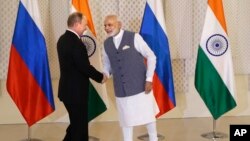India and Russia deepened economic and military cooperation, while New Delhi pressed its concerns about cross-border terrorism at a summit of the BRICS countries in the western Indian city of Goa.
Indian Prime Minister Narendra Modi held talks with the Russian and Chinese leaders on Saturday on the sidelines of the meeting of the five emerging economies of Brazil, Russia, India, China and South Africa.
After India and Russia signed a slew of defense and energy deals worth billions of dollars, Modi said “the highly productive outcomes of our meeting clearly establish the special and privileged nature of our strategic partnership.”
His talks with Russian President Vladimir Putin are aimed at rejuvenating a relationship that appeared to have drifted in recent years as India deepened ties with the United States and Russia developed closer links with China and Pakistan.
The 16 agreements signed by New Delhi and Moscow include joint production of 200 military helicopters. India will also buy stealth frigates for its navy and a state of the art anti-missile air defense system that will strengthen its defenses along the border with Pakistan and China.
In the biggest deal, Russia's largest oil company, Rosneft, signed an agreement to buy a controlling stake in India's Essar Oil for about $13 billion.
The second reactor of a Russian-built nuclear plant in southern India was also hooked to the grid as the two leaders looked on via a video link and the foundation was laid for starting work on two more reactors.
In his meetings with BRICS leaders, Modi also sought to put cross-border terrorism on the BRICS agenda, as India pushed for a strong statement against terrorism by the end of the summit on Sunday.
Following the recent spike in tensions with Pakistan in the wake of a militant attack on an Indian army camp, the Indian leader has vowed to mount a diplomatic offensive against what he says is a threat to his country from Pakistan’s alleged support for Islamic militant groups.
After meeting Putin he said “Russia’s clear stand on the need to combat terrorism mirrors our own.” A joint statement by both countries stressed the need for “zero tolerance in dealing with terrorists and their supporters.”
It was less clear what support New Delhi gets from Beijing, which is a close ally of Pakistan, and which has so far blocked India’s efforts to put the head of the Pakistan-based militant group Jaish-e-Mohammad on a United Nations terror list.
Following Modi’s meeting with Chinese President Xi Jinping, Indian Foreign Ministry spokesman Vikas Swarup said both sides recognize terrorism as a key issue and agreed to step up counterterrorism efforts. He said Modi had told the Chinese leader that “no country is immune from terrorism and hence this is an issue on which we cannot afford to have any differences.”
Tibetan activists staged protests in Goa as the Chinese president arrived, but were quickly taken away by police.





